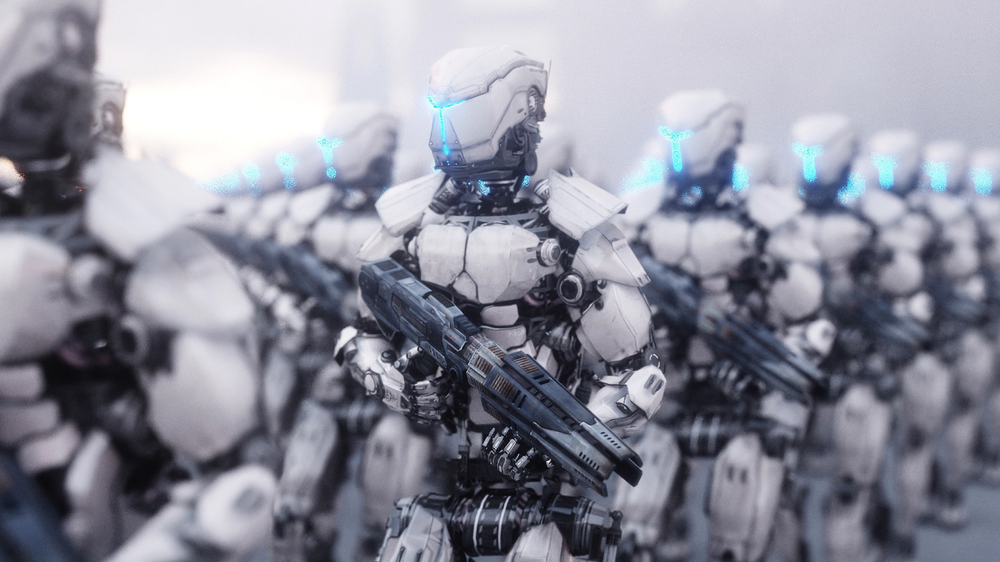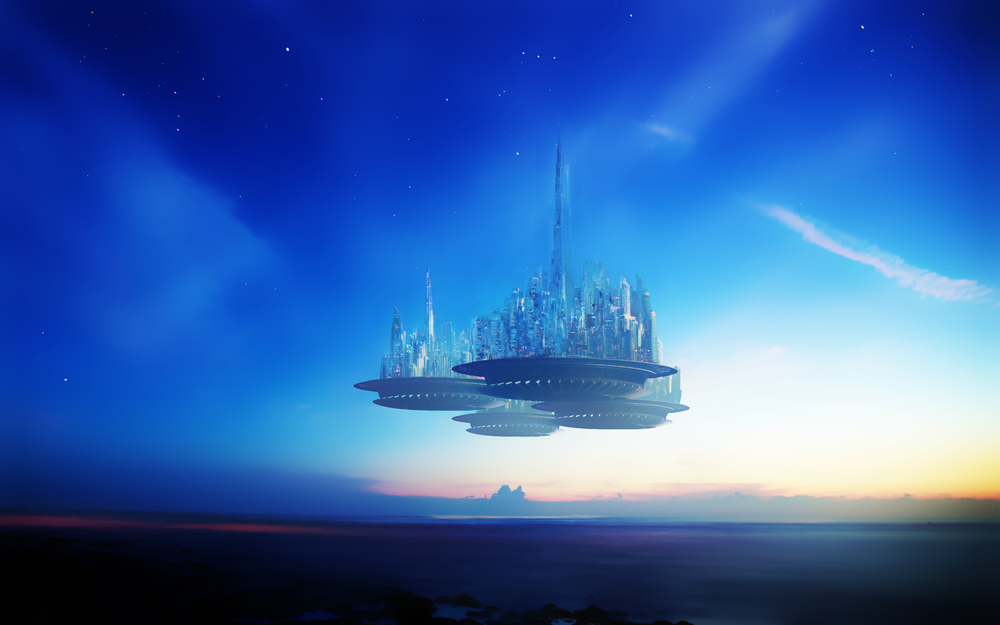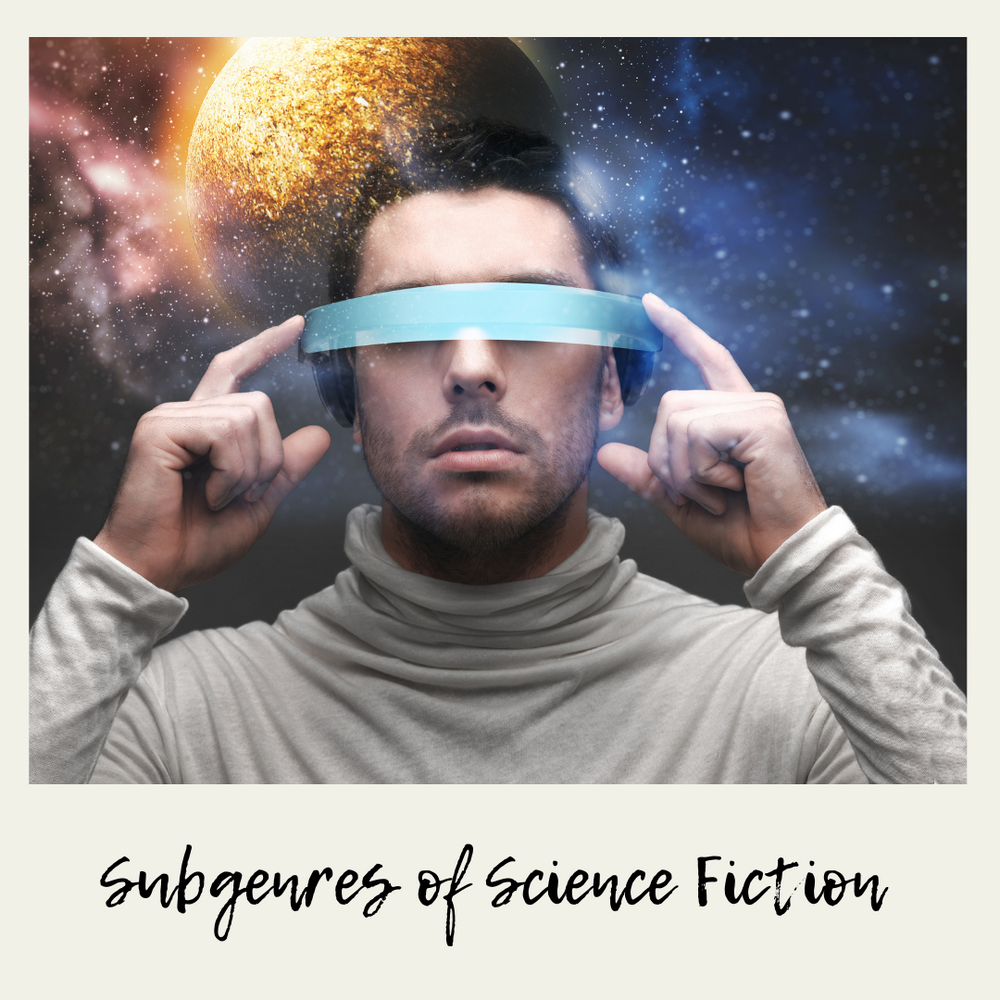Science fiction is a very inventive literary genre. It transports readers to far-flung planets, submerged realms, and all points in between, exposing them to exotic people and technology along the way. Discover more about this fascinating genre.
Subgenres of Science Fiction
Aliens

A subgenre of science fiction in which humans meet alien creatures. These encounters may be amorous or horrific, and frequent themes include:
- Connection.
- Fear of the “other,” interplanetary conflict.
- A better understanding of one’s position in the cosmos.
Alternate History
In this subgenre, the world as we know it is altered due to alternative historical occurrences. There are often “what if” situations at critical times in history and offer varied results from those recorded in history.
Alternate/Parallel Universe
A subgenre in which another world coexists with our own. Typically, these tales include travel to parallel worlds or universes that are either drastically different from our own or eerily similar. There is also a link between this subgenre and the time travel subgenre.
Apocalyptic/Post-Apocalyptic

A subgenre in which a global catastrophe, such as a pandemic virus or nuclear holocaust, has happened. Community, environmental devastation, pandemic viruses, survival, human nature, and dystopian civilizations are prevalent topics in this subgenre.
Biopunk
A subgenre of science fiction occurs in the near future and involves biotechnology, genetic modification, or eugenics. The subgenre is derived from cyberpunk but is concerned with the consequences of biotechnology rather than information technology. Biohackers, biotech mega-corporations, and repressive government organizations manipulating human DNA are frequent themes. Bioengineering is often seen in a negative light.
Children’s Story
A subgenre of science fiction aimed towards younger readers, with characters in their early teens or more youthful years. Frequently, “coming of age,” situations are included. While aliens, sophisticated technology, and dystopian civilizations are often included in science fiction, violence and other “adult” topics are frequently ignored.
Colonization
A subgenre in which individuals (or other lifeforms) colonize a new region or planet. Humans may establish colonies for various causes, including overpopulation on Earth, a barren Earth, discovering other worlds, resource acquisition, or the danger of human extinction.
Comedy
This subgenre is characterized by a high level of comedy and satire of science fiction clichés and a gloomy perspective of humanity. Social customs are often mocked. This is a somewhat obscure subgenre of science fiction that is more prevalent in short stories than novels and is often depicted in the film.
Cyberpunk
A subgenre of science fiction in which humans and machines coexist, literally or figuratively, and various kinds of virtual reality exists. Typically, cyberpunk tales take place on Earth, but a cyber world surrounds it. The connection between people and computers is often explored, typically in a dark and dismal environment, as are cybernetics, prosthetics, cyborgs, and the internet.
Dying Earth
A subgenre in which the Earth is on the verge of extinction. The stories in this subgenre often take place towards the end of the Earth’s life, implying that they occur in the future. The themes that usually appear are fate, contemplation, lost innocence, idealism, entropy, resource depletion, and hope. The settings of these tales are often desolate and antiseptic, with a dwindling sun. This subgenre and apocalyptic fiction have some overlap.
Dystopia

A subgenre in which the world has degenerated into the polar opposite of a utopia. The protagonist must free himself (or a whole society) from it. The police state, crushing poverty, political control, and a lack of personal freedom are prevalent themes. The stories in this subgenre often include extensive societal control and an examination of what we fear will happen to humanity in the future.
Galactic Empire
In this subgenre, an empire spanning universes exists. The tale is often set in the empire’s capital and frequently incorporates themes of dystopian science fiction. Oftentimes, the protagonist is a member of the empire’s armed forces.
Generation Ship
The protagonist embarks on a lengthy journey on a spacecraft, and the original inhabitants perish, leaving their descendants to either stay or choose another home. Generations have existed and died aboard the ship as it travels throughout the cosmos, and societal change is often a result. Usually, the spacecraft will contain a sophisticated ecology, and the ship will have a mission, such as colonizing a faraway planet.
Hard Science Fiction
It is characterized by meticulous scientific precision and a lack of emphasis on people or surroundings. This is a subgenre that focuses on telling tales from a scientifically accurate viewpoint, emphasizing technical detail.
Immortality
A subgenre in which creatures have been (and continue to exist) in perpetuity. This subgenre is centered on everlasting life, either as a gift brimming with unlimited potential or as the end of change brimming with monotony and stagnation.
Lost Worlds
The protagonist embarks on a journey to unknown or secluded locations such as islands, continents, jungles, or planets to find some marvel or old technology. These tales are often action-packed, and the worlds explored are frequently separated from our own, with their history and geography.
Military

Interstellar or interplanetary armed warfare is a subgenre. Military ideals like courage, sacrifice, duty, and brotherhood are often emphasized, and the protagonist is almost always a soldier. Military science fiction is usually set in outer space or on a distant planet and includes future technology and weaponry.
Mind Transfer
The person’s consciousness is downloaded into a computer or transferred to another person’s brain. This may happen in a variety of ways, including through computer, psychic ability, extraterrestrial technology, or actual brain transplantation, and the transfer can be temporary or permanent. Frequently, the procedure destroys the original or duplicates it.
Mundane Science Fiction
It is set in the not-too-distant future, with plausible usage of technology that is now accessible or might become available in the imminent future. These tales are based on Earth and focus on scientific facts such as biotechnology and environmental change.
Mythic
The narrative in this subgenre is influenced by or closely resembles myth and folklore. The tale may be a complete retelling of a famous myth or rely on mythological motifs and themes. There is a varying degree of genuine science since myth has fanciful components.
Nanopunk
This subgenre is akin to cyberpunk, in which the usage of nanotechnology and its consequences for human life are examined. The nanopunk realm is one in which the theoretical axiom of nanotechnology has become a reality and has been successfully incorporated into our environment and human life.
Robots/A.I.

This subgenre includes robots and artificial intelligence. Generally, this subgenre is concerned with one of three mentalities: pro-robot, anti-robot, or ambivalence. Robots are benign in a pro-robot storyline. In most anti-robot plots, there is a conflict with robots, androids, or artificial intelligence. In an ambiguous storyline, robots are beneficial but can cause worry.
Science Fantasy
There are aspects of fantasy in this subgenre, but they are enhanced by modern technology (making it lean more toward science fiction). These tales depict a fantastical future world influenced by soft science. Additionally, these tales may include science that is so advanced that it seems magical, and people exhibit magical powers due to scientific technology.
Science Horror
This subgenre of science fiction has horror overtones. Frequently, these tales include themes such as medical research leading to the discovery of new illnesses, aliens trying to murder humanity, artificial intelligence revolting against its creator(s), or atomic weapons and technology culminating in human devastation.
Slipstream
This subgenre incorporates aspects of surrealism and postmodernism. It spans the literary and speculative fiction genres, including science-fiction, fantasy, and both. It is often characterized as strange, irrational, surreal, and disorienting.
Soft Science Fiction
A subgenre that places a greater emphasis on characters than on science. Typically, these tales focus on the soft sciences and social sciences and are more concerned with human behavior and affairs than scientific details.
Space Exploration
A subgenre of science fiction in which outer space is explored and considerable information is provided about the journey. Some of these tales portray space travel as a natural progression for humankind, while others portray it as a need for the species’ existence. Generally, these tales concentrate on humanity’s flaws and frailties.
Space Opera
It is characterized by swashbuckling action and vast, panoramic landscapes. These tales often include outlandish characters, themes, and storylines. The narrative is usually romantic or theatrical, and the plot is action-packed. The plot does not necessarily adhere to established scientific, mathematical, or physical principles.
Spy Fiction (SpyFi)
A type of science fiction in which espionage, high-tech duels, and outlandish devices are prevalent. There is a greater emphasis on the application of the devices than on the science underlying them. The narrative often revolves around the glamour, excitement, and fearless attitude of spies (think James Bond), with romantic interludes with beautiful ladies.
Steampunk
A subgenre of that is usually set in Victorian periods and features sophisticated technology such as steam power. The scientific details are sparse, and the devices are often better characterized as retro-futuristic. These tales are a reinterpretation of contemporary technology’s possibilities through a Victorian perspective, and they construct an alternative past.
Time Travel
In this subgenre, the protagonists travel across time. This may imply that the character(s) go to a future point in time; it can also mean that they travel to a previous point in time. Additionally, these books include characters that go to parallel or alternative worlds in an unknown period.
Utopia

A subgenre in which humankind lives in a paradise where society’s ills have been solved by technology. In many of these tales, war and disease have been eradicated, often via the use of sophisticated technology. There is often much debate of societal ramifications and investigation of social sciences. With questions such as: What does a Utopia look like? Is the Utopia of one individual the same as the Utopia of another?
Young Adult
It is written for an adolescent or young adult readership, with an adolescent or young adult protagonist. Within a dystopian society, romance is often blossoming, and the protagonist struggles with coming-of-age problems such as autonomy, rebellion, and survival without grownups.
Are you looking for a literary agent? Handing your book to publishers is a daunting task. However, companies like Quantum Discovery can help you with your needs when it comes to having your book delivered to the right publisher. Contact our professionals by calling (888) 755-6875 or visit quantumdiscovery.net to know more.
